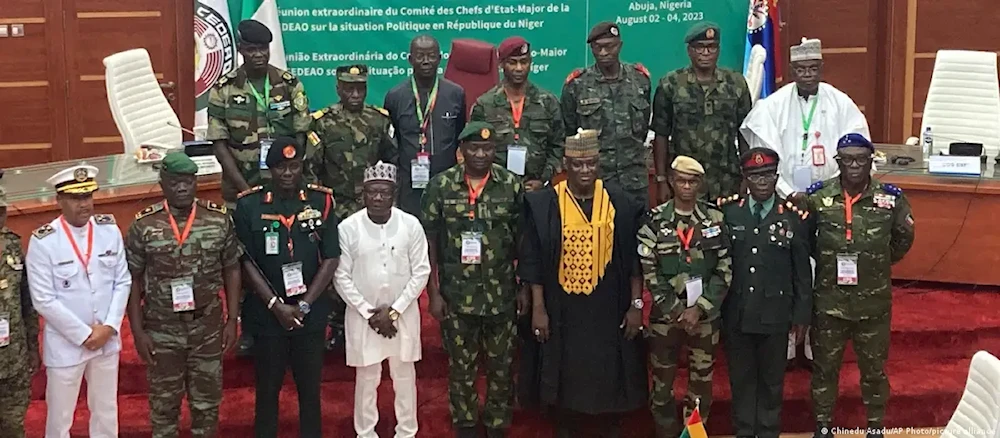ECOWAS' stringent sanctions imposed on Niger lifted
In an emergency summit of heads of state in Abuja, the chief of the ECOWAS Commission announces the immediate cessation of measures against Niger.
-

West African military chiefs meeting in Ghana in 2023 (AP)
West Africa's ECOWAS regional bloc announced, on Saturday, the lifting of certain sanctions imposed on Niger in the aftermath of last year's military coup.
The measures, including a no-fly zone, border closures, and asset freezes, are being halted "immediately" on "humanitarian grounds", as stated by ECOWAS Commission chief Omar Alieu Touray after an emergency summit of heads of state in Abuja.
Following a military coup that ousted Niger's president, Mohamed Bazoum, in July last year, the Economic Community of West African States (ECOWAS) responded by suspending trade and implementing stringent sanctions. However, despite the bloc's initial warning of potential military intervention, there is minimal indication that Bazoum, who remains imprisoned in the presidential palace in Niamey, is on the verge of being reinstated.
During the summit in Nigeria's capital, Touray advocated for the "immediate release" of Bazoum. He specified that the measures slated for removal encompass the freezing of Niger's assets in ECOWAS central banks and the suspension of financial transactions between ECOWAS states and Niger.
But Touray said as quoted by AFP that "individual sanctions as well as political sanctions remain in place in Niger... (and) in other countries political sanctions remain."
At the commencement of the summit, Nigeria's President Bola Ahmed Tinubu urged concerned West African leaders to reconsider their approach to addressing the states in the region that have experienced coups.
Tinubu told the leaders they were meeting at a "critical juncture", adding, "We must re-examine our current approach to the quest for constitutional order in four of our member states."
Tinubu, who is also head of ECOWAS, urged Mali, Burkina Faso, and Niger to "reconsider the decision" of prompt exit from the West African bloc ECOWAS and said they should "not perceive our organization as the enemy."
Read next: Senegal constitutional body overturns presidential vote delay
The big picture
Military governments in Burkina Faso, Mali, and Niger declared in January their prompt exit from the West African bloc ECOWAS.
At the time, the leaders of the three Sahel nations released a statement, asserting that their departure from the Economic Community of West African States (ECOWAS) was a "sovereign decision" to be executed "without delay".
Facing challenges from the ongoing insurgencies and economic hardship, the governments have experienced strained relations with ECOWAS, particularly following coups in Niger in July of last year, Burkina Faso in 2022, and Mali in 2020.
All three nations were suspended from ECOWAS, with Niger and Mali enduring substantial sanctions.
Alliance of the Sahel States
In recent months, these countries have solidified their stances and formed an "Alliance of Sahel States."
Last month, the prime minister appointed by Niger's military criticized ECOWAS for "bad faith", expressing dissatisfaction as the bloc largely avoided a scheduled meeting in Niamey.
Niger expected a chance to address differences with fellow ECOWAS states, but the organization had been distant, subjecting Niamey to substantial economic and financial sanctions in response to the military coup that ousted elected President Mohamed Bazoum.
On July 30, 2023, ECOWAS (the Economic Community of West African States) froze Niger's assets, imposed sanctions on the junta officials, and gave a stern warning of military intervention if the former government is not restored within a week's deadline.
Correspondingly, the junta took a set of measures to consolidate its authority and fortify its anti-imperialist stance: halting uranium and gold exports to Europe, revoking all military deals with France, and blocking French media platforms France24 and RFI. Additionally, the military leaders warned France and ECOWAS against any military intervention: stressing that they will "resolutely defend their homeland."
Regional countries have also taken opposing stances on Niger. Original members of the Western-backed ECOWAS bloc, such as Senegal, have affirmed their commitment to partake in the military intervention.
Mali and Burkina Faso who had also defected from the Western bloc vehemently opposed the threat of military intervention against Niger saying they would consider it a declaration of war against their respective nations if the ECOWAS bloc went through with the threatened military intervention.
Read more: Niger and the African struggle against neo-colonialism

 4 Min Read
4 Min Read








